
需求:vue项目实现中英文切换
效果图如下:
步骤一:安装vue-i18n
注意:如果使用vue3,则不用指定版本安装,如果是vue2,就要指定版本如下:
javascript">npm i vue-i18n@8.23.0步骤二:创建基本目录(language文件夹是翻译的数据文件,views文件夹下的是页面,part1和part2代表项目的不同模块,每个模块下都有对应的页面)
步骤三:简单编写下基本界面
App.vue
<template>
<div id="app">
<!-- 111 -->
<!-- 中英文切换 -->
按我切换中英文
<button @click="chagelanguage">{{ language }}</button>
<router-view />
</div>
</template>
<script>
export default {
data() {
return {
language: "en",//中英文切换
}
},
methods: {
// 中英文切换
chagelanguage() {
this.$i18n.locale == 'zh' ? this.$i18n.locale = 'en' : this.$i18n.locale = 'zh' //设置中英文模式
if (this.$i18n.locale === 'zh') {
this.language = "en"
} else {
this.language = "zh"
}
},
}
}
</script>
<style lang="less" scoped></style>
views/part1/page1.vue
<template>
<div>
<h1 style="color:black">part1 page1</h1>
<p><span style="color:blue;font-weight:bold;font-size: 20px;">测试文本:</span>{{ $t("part1.page1.content") }}</p>
<br>
<br>
<a style="color: red;" @click="gopart1page2">点我跳转part1 page2</a>
</div>
</template>
<script>
export default {
methods: {
gopart1page2() {
// 跳转part1 page2(同一模块下的不同页面)
this.$router.push('/part1page2Router')
}
}
}
</script>
<style>
</style>views/part1/page2.vue
<template>
<div>
<h1>part1 page2</h1>
<p><span style="color:blue;font-weight:bold;font-size: 20px;">测试文本:</span>{{ $t("part1.page2.content") }}</p>
<br>
<br>
<a style="color: red;" @click="gopart2page1">点我跳转part2 page1</a>
<br>
<a style="color: red;" @click="goback">返回</a>
</div>
</template>
<script>
export default {
methods: {
gopart2page1() {
// 跳转part1 page2(不同模块下的不同页面)
this.$router.push('/part2page1Router')
},
goback() {
// 返回上一页面
this.$router.go(-1)
}
}
}
</script>
<style></style>views/part2/page1.vue
<template>
<div>
<h1>part2 page1</h1>
<p><span style="color:blue;font-weight:bold;font-size: 20px;">测试文本:</span>{{ $t("part2.page1.content") }}</p>
<br>
<br>
<a style="color: red;" @click="goback">返回</a>
</div>
</template>
<script>
export default {
methods: {
goback() {
// 返回上一页面
this.$router.go(-1)
}
}
}
</script>
<style></style>router/index.js
import Vue from 'vue'
import VueRouter from 'vue-router'
import part1page1 from '@/views/part1/page1'
import part1page2 from '@/views/part1/page2'
import part2page1 from '@/views/part2/page1'
Vue.use(VueRouter)
const routes = [
{
path: '/',
***ponent: part1page1
}, {
path: '/part1page2Router',
***ponent: part1page2
}, {
path: '/part2page1Router',
***ponent: part2page1
}
]
const router = new VueRouter({
routes
})
export default router
步骤四:编写翻译文件
language/data/part1/page1.js
const data = {
ZH: {
// part1 page1
content: "我是part1page1,喜欢吃苹果!"
},
EN: {
content: "I am Part1Page1 and enjoy eating apples!"
}
}
export default datalanguage/data/part1/page2.js
const data = {
ZH: {
// part1 page1
content: "我是part1page2,喜欢吃草莓!"
},
EN: {
content: "I am Part1Page1 and enjoy eating strawberries!"
}
}
export default datalanguage/data/part1/index.js
import page1 from "./page1"
import page2 from "./page2"
export default {
page1,
page2
}language/data/part2/page1.js
const data = {
ZH: {
// part1 page1
content: "我是part2page1,喜欢吃芒果!"
},
EN: {
content: "I am Part1Page1 and enjoy eating mangoes!"
}
}
export default datalanguage/data/part2/index.js
import page1 from "./page1"
export default{
page1
}language/en.js
import part1 from './data/part1/index'
import part2 from './data/part2/index'
const en = {
language: {
name: "english"
},
// part1
part1: {
page1: {
content: part1.page1.EN.content
},
page2: {
content: part1.page2.EN.content
}
},
// part2
part2: {
page1: {
content: part2.page1.EN.content
}
},
}
export default enlanguage/zh.js
import part1 from './data/part1/index'
import part2 from './data/part2/index'
const zh = {
language: {
name: "中文"
},
// part1
part1: {
page1: {
content: part1.page1.ZH.content
},
page2: {
content: part1.page2.ZH.content
}
},
// part2
part2: {
page1: {
content: part2.page1.ZH.content
}
},
}
export default zh步骤五:全局配置
main.js
import Vue from 'vue'
import App from './App.vue'
import router from './router'
import store from './store'
//中英文切换
import ZH from '@/language/zh.js' //中文最终汇总暴露的信息
import EN from '@/language/en.js' //英文
import VueI18n from 'vue-i18n'
Vue.use(VueI18n)
const i18n = new VueI18n({
// localStorage.getItem('languageSet') || 'zh'
locale: 'zh', //从localStorage里获取用户中英文选择,没有则默认中文
messages: {
'zh': ZH,
'en': EN
}
})
new Vue({
i18n,
router,
store,
render: h => h(App)
}).$mount('#app')
另外:
如果要在js中引用如下
this.$t("part1.page1.content")在属性中引用如下
<el-tooltip :content="$t('part1.page1.content')" placement="top"></el-tooltip>
